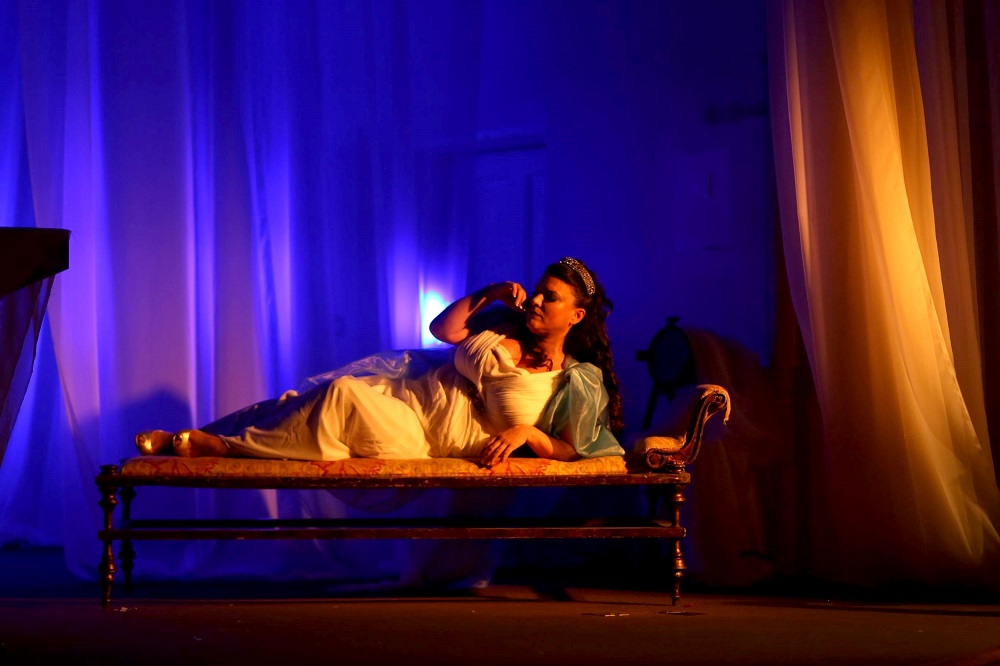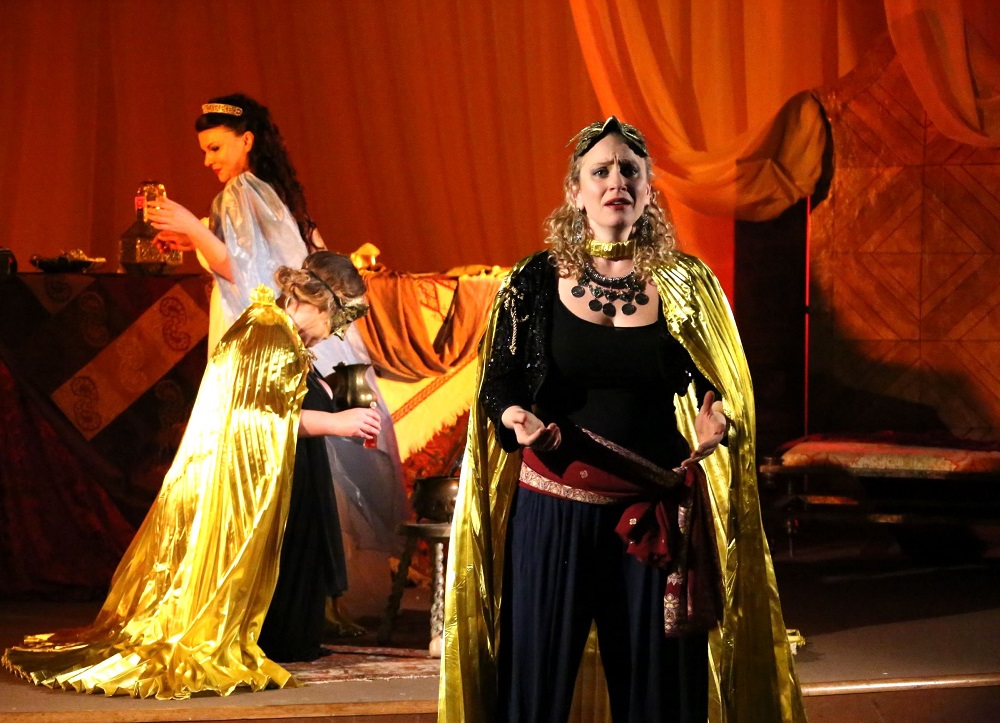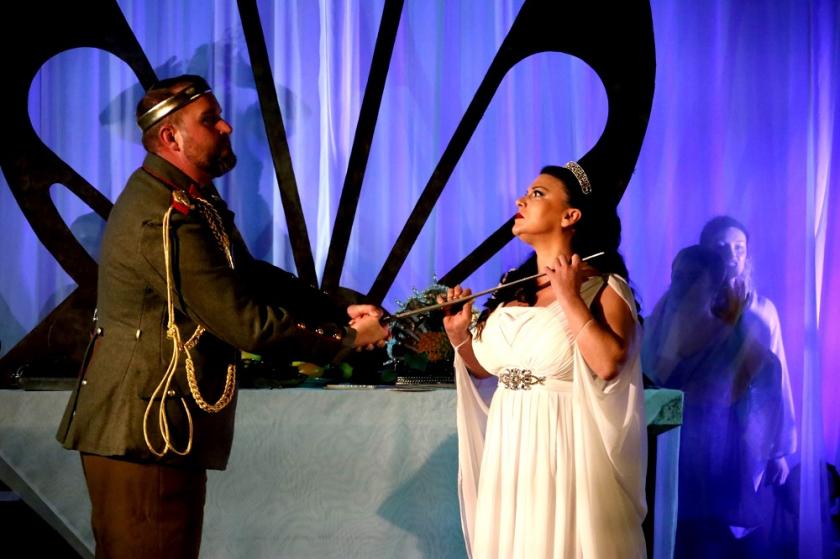So Helen of Troy arrives at a church in Fulham via Poseidon’s island palace and a pavilion at the foot of the Atlas Mountains. She’s trickier than ever in the golden but tangled web Richard Strauss and his myth-and-symbol-mad poet Hugo von Hofmannsthal weave around the story of a phantom beauty wreaking havoc on Greeks and Trojans while the real version gets whisked off to the Egyptian desert. Given an ultimately voluptuous first act and a disastrously wambling second, it’s the most perilous Strauss opera of the lot, and it seemed like madness for a pocket group in west London to take it on. Do they pull it off? Amazingly, yes.
The de luxe Strauss orchestra of over 100 has been whittled down by the extremely hard-working pianist, Paul Plummer, to an ensemble of six, plus the organ of St John's Church for portentous moments. The stage is essentially the space around in the altar, draped in Act One for a sea-feast. Designer Alexander McPherson has achieved no small style with minimal expense, backed up by Mitch Broomhead’s chameleonic lighting; Hofmannsthal wanted evocation of the post-war period including references to the films of the time, and the original sea-shell-evoking deco of the 1928 Dresden premiere has not been ignored.  Within this framwork, the acting as directed by Guido Martin-Brandis is minimal; you wouldn’t really know, for instance, that cool-as-sea-cucumbers Helen and Menelaus had just been shipwrecked by the storm-summons of Poseidon’s consort Aithra, or that she’s terrified he’s finally going to kill her for her catastrophic adultery with Paris. But determined conductor and Fulham Opera powerhouse Ben Woodward has cast from strength. Maybe in this space and given the small instrumental forces we don’t need an heroic-dramatic soprano and tenor, but he’s found them in Justine Viani and Brian Smith Walters. Viani could still pull the voice in for focus in the longer phrases, and Smith Walters is short at the very top of the voice, but both impress in the beaten-bronze middle ranges, especially so when the whole drama could become otiose in the later stages of Act Two.
Within this framwork, the acting as directed by Guido Martin-Brandis is minimal; you wouldn’t really know, for instance, that cool-as-sea-cucumbers Helen and Menelaus had just been shipwrecked by the storm-summons of Poseidon’s consort Aithra, or that she’s terrified he’s finally going to kill her for her catastrophic adultery with Paris. But determined conductor and Fulham Opera powerhouse Ben Woodward has cast from strength. Maybe in this space and given the small instrumental forces we don’t need an heroic-dramatic soprano and tenor, but he’s found them in Justine Viani and Brian Smith Walters. Viani could still pull the voice in for focus in the longer phrases, and Smith Walters is short at the very top of the voice, but both impress in the beaten-bronze middle ranges, especially so when the whole drama could become otiose in the later stages of Act Two.
They also form a stunning trio at times with Luci Briginshaw’s Aithra (pictured below with Viani), the most rounded performance of the evening (not so surprising given that Strauss and Hofmannsthal make her a real being, not a confounding symbol, but Briginshaw could sing the role anywhere in the world). The other voice of real polish belongs to Ingeborg Børch, having fun with the prophetic Omniscient Mussel who tells Aithra what’s going on elsewhere – part sea-sibyl, part radio broadcaster. Given some vocal class in Aithra’s court of attendants and elves, too, the opening scene immediately draws you in to an evening that is always compelling, whatever the longueurs of the score. Never forget the difficulties of learning this music, and singing it in German (we even get the English translation at the sides of the stage).  Strauss's greatest 20 minutes is the bedchamber scene at the end of Act One, beginning with a hypnotic horn solo – superbly taken by Francesca Bridger – and magical writhings which anticipate the “exoticism” of Rodgers and Hammerstein’s South Pacific. This is reunion of husband and wife by illusion. It’s when Helen wants to get her consort back by facing the past – the potion of remembrance, dragging in Tristan ingredients – that the trouble starts, and all traces of the Offenbachian mythological spoof Strauss originally wanted to compose sink without trace. Throughout Act One, Menelaus’s near-breakdown mental state is served by dissonant writing that sounds very like th Schoenberg of the First Chamber Symphony, Hindemith or Weill from this chamber group. But with the introduction of a desert Sheikh, Altair (Oliver Gibbs, stalwart), and his son Da’ud (Dominic J Walsh, almost making the boy's simple music touching), the music becomes wracked with the daft orientalisms that Strauss mostly avoided in Salome – mercifully toned down in the instrumental group here, clarinet working overtime – and Hofmannsthal moves into the abstractions of Goethe’s Faust Part Two to try and justify a truth-and-reconciliation grand finale once Da’Ud has been sacrificed as a second Paris (psychological purging for Menelaus).
Strauss's greatest 20 minutes is the bedchamber scene at the end of Act One, beginning with a hypnotic horn solo – superbly taken by Francesca Bridger – and magical writhings which anticipate the “exoticism” of Rodgers and Hammerstein’s South Pacific. This is reunion of husband and wife by illusion. It’s when Helen wants to get her consort back by facing the past – the potion of remembrance, dragging in Tristan ingredients – that the trouble starts, and all traces of the Offenbachian mythological spoof Strauss originally wanted to compose sink without trace. Throughout Act One, Menelaus’s near-breakdown mental state is served by dissonant writing that sounds very like th Schoenberg of the First Chamber Symphony, Hindemith or Weill from this chamber group. But with the introduction of a desert Sheikh, Altair (Oliver Gibbs, stalwart), and his son Da’ud (Dominic J Walsh, almost making the boy's simple music touching), the music becomes wracked with the daft orientalisms that Strauss mostly avoided in Salome – mercifully toned down in the instrumental group here, clarinet working overtime – and Hofmannsthal moves into the abstractions of Goethe’s Faust Part Two to try and justify a truth-and-reconciliation grand finale once Da’Ud has been sacrificed as a second Paris (psychological purging for Menelaus).
Not even the most expensive productions in the world, or a luxury ensemble like the Royal Opera one mustered by Christian Thielemann in a 1998 concert performance starring Deborah Voigt, can paper over the cracks here, Woodward has done well to go for the 1933 revision of Act 2, its UK premiere. Though the act still flails, it’s somehow more enjoyable at this level. What an achievement. Go and see it, bearing in mind the problems and challenges, and you’ll not forget the experience.














Add comment